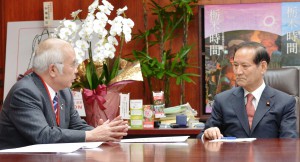
JA-Zenchu President Akira Banzai (left) explains the JA group’s self-reform plan to agriculture minister Koya Nishikawa at the ministry on Friday, Nov. 7.
Agriculture minister Koya Nishikawa pointed out on Friday, Nov. 7, that “a gap exists” between the agricultural co-op group’s self-reform plan and the government’s stance regarding central and prefectural unions’ auditing authority and the system for non-farmer members. The two issues are likely to become a focus of future debate on revising the Agricultural Co-operative Society Law.
“I acknowledge that the report is compiled by their efforts (to reform itself),” Nishikawa told reporters after receiving explanation from Akira Banzai, president of the Central Union of Agricultural Co-operatives (JA-Zenchu), on the group’s self-reform plan. “Concerning the Norinchukin Bank and the National Mutual Insurance Federation of Agricultural Co-operatives (Zenkyoren), the direction (of reform) is the same (as that of the government).”
Meanwhile, as for the JA-Zenchu’s plan to facilitate non-farmer members’ participation in JAs’ businesses and management, Nishikawa said the JA group should concentrate on doing business for farmers. “The JA group says (in its self-reform plan) it will work on a range of issues such as regional issues, but since it is a co-operative, we have a little bit different view on how to treat non-farmer members,” he said.
The self-reform plan states that central and prefectural unions should maintain their auditing authority under the law, but Nishikawa said there are voices questioning the need for such a compulsory auditing when primary JAs are to be given freer hand on production and sales of farm products under the new system. He said further discussion will be conducted among the government, the JA group and the ruling bloc.
In the regulatory reform action plan released in the end of June, the government states it plans to discuss the issue based on the JA group’s self-reform plan and submit a bill to revise the law to the ordinary Diet session next year.
When explaining the group’s self-reform plan to Nishikawa earlier in the day, Banzai stressed the need to legally authorize central and prefectural unions under the law so that they can fully contribute to promotion of agriculture and regional revitalization, as well as supporting efforts by primary JAs.
The self-reform plan is targeted at increasing farmers’ income and agricultural production and revitalizing regional areas. “As co-operatives rooted in regional communities, we will make maximum efforts to play the role of revitalizing agriculture and regions, focusing on food and farming,” Banzai said.
The meeting was also attended by JA-Zenchu Vice President Toru Nakaya, Executive Director Shigeo Fuji, Managing Director Hajime Taniguchi, Zenkyoren Chairman Kotaro Ichimura, Norinchukin Bank President Yoshio Kono and Masanobu Yoshinaga, senior managing director of the National Federation of Agricultural Co-operative Associations (JA Zen-Noh).
(Nov. 8, 2014)

